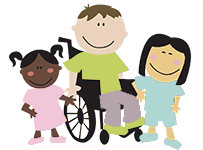[vc_row][vc_column width=”1/2″][vc_column_text]Eating solid foods and drinking from a cup are learned processes that children will initially struggle with, but if your child continues to have trouble, it’s possible that they have a feeding disorder. It’s important to diagnose feeding disorders as soon as possible because they could lead to issues with health, learning, and socialization.
Signs of a Feeding Disorder
There are many things you can look for to determine if your child has a feeding disorder. These include:[/vc_column_text][/vc_column][vc_column width=”1/2″][vc_column_text] [/vc_column_text][/vc_column][/vc_row][vc_row][vc_column][vc_column_text]
[/vc_column_text][/vc_column][/vc_row][vc_row][vc_column][vc_column_text]
- Arching their back, growing stiff, crying, or fussing when you feed them
- Showing breathing difficulty when they’re eating or drinking
- Refusing to eat or drink
- Only being willing to eat foods that have certain textures (e.g. soft, crunchy)
- Taking a long time to eat – oftentimes coughing, gagging, or drooling while eating
- Having problems with chewing their food
- Sounding gurgly, hoarse, or breathy either during or after a meal
- Spitting up or throwing up a lot
- Not gaining any weight or otherwise growing as other healthy children their age do
- Continually showing signs of poor nutrition (e.g. being dehydrated)
- Aspiring – when food or liquid enters their airway (something that can cause lung infections like pneumonia)
- Refusing to eat with other people due to embarrassment
Treating Feeding Disorders
Your first point of contact if you feel that your child may have an eating disorder should be your doctor. They can test for medical issues and check their growth and weight. If they do believe that there’s a feeding issue, they will then refer you to an SLP (speech learning pathologist) who can help with some of the following treatments:
Strengthening the mouth’s muscles
- Helping with tongue movement or chewing
- Attempting different ways to encourage your child to try new foods and drinks so your child will get more of the calories they need
- Working with your child to suck from a bottle or drink from a cup better
- Dealing with sensory issues, especially in older children who often dislike how food feels in their mouth or hands
Sometimes an SLP will also show you some things you can do as the parent. For instance, they may show you new ways you can handle your child’s behavior – encouraging them to stay seated throughout a meal, not refuse food, and not fuss or cry while eating.
SLPs are the ones who can help diagnose and treat children with feeding disorders. If you live in Plano, Texas, you should seek help from the SLPs here at Speech and OT. Over the years we have helped many children with great success, and yours can be next.[/vc_column_text][/vc_column][/vc_row]
